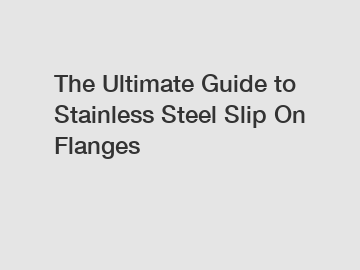The Ultimate Guide to Stainless Steel Slip On Flanges
The Ultimate Guide to Stainless Steel Slip On Flanges.
Stainless steel slip-on flanges are an essential component used in various industries, especially in the piping systems. They provide a secure and leak-proof connection between pipes, valves, and other equipment. With their exceptional strength, durability, and resistance to corrosion, stainless steel slip-on flanges have become the preferred choice for many industries. This ultimate guide aims to provide comprehensive information about stainless steel slip-on flanges, including their features, applications, and advantages.
Features of Stainless Steel Slip-On Flanges:

1. Material: Stainless steel slip-on flanges are typically made from high-quality stainless steel, which gives them excellent resistance to corrosion, rust, and other environmental factors. The most common types of stainless steel used for slip-on flanges include 304, 316, and 316L.
2. Design: Slip-on flanges have a flat face on one side, which makes them easy to install and align with the pipe. This design also allows for easy cleaning and maintenance. The inner diameter of slip-on flanges matches the outer diameter of the pipe, providing a snug fit and preventing leaks.
3. Size and Pressure Rating: Stainless steel slip-on flanges come in various sizes and pressure ratings to accommodate different piping systems. They are available in sizes ranging from 1/2 inch to 48 inches and can handle pressure ratings ranging from 150 lbs to 2500 lbs.
Applications of Stainless Steel Slip-On Flanges:
1. Oil and Gas Industry: Stainless steel slip-on flanges are widely used in the oil and gas industry for connecting pipes, valves, and other equipment. They are particularly effective in offshore drilling rigs and oil refineries, where strength and corrosion resistance are crucial.
2. Chemical Industry: Slip-on flanges are frequently used in chemical plants and processing facilities. The stainless steel construction ensures they can withstand corrosive chemicals and high temperatures, making them ideal for connecting pipelines in chemical processes.
3. Water Treatment and Desalination Plants: Slip-on flanges play a vital role in water treatment and desalination plants, where they are used to connect pipelines carrying treated water or desalinated water. The stainless steel construction ensures clean and hygienic water flow, preventing contamination.
4. Food and Beverage Industry: Slip-on flanges are commonly used in the food and beverage industry, where cleanliness and hygiene are essential. The stainless steel material is easy to clean, ensuring no residue or bacteria is retained, making it suitable for processing and transporting food products.
Advantages of Stainless Steel Slip-On Flanges:
1. Corrosion Resistance: Stainless steel slip-on flanges offer excellent resistance to corrosion, rust, and chemicals. This makes them highly suitable for environments where exposure to moisture, chemicals, and extreme temperatures is common.
2. Strength and Durability: With their robust construction, stainless steel slip-on flanges provide exceptional strength and durability. They can withstand high-pressure applications and are resistant to wear and tear, ensuring a long lifespan.
3. Easy Installation: Slip-on flanges are relatively easy to install as they only require welding on the outer side, ensuring a secure connection. Their flat face design makes alignment straightforward, reducing installation time and effort.
4. Cost-Effective: Despite their numerous advantages, stainless steel slip-on flanges are cost-effective compared to other flange types. Their durability and resistance to corrosion eliminate the need for frequent replacements, resulting in long-term cost savings.
Conclusion:
Stainless steel slip-on flanges are an essential component used in various industries due to their exceptional strength, durability, and corrosion resistance. Their use in the oil and gas, chemical, water treatment, and food industries ensures efficient and leak-proof connection of pipes, valves, and equipment. The advantages of stainless steel slip-on flanges, such as corrosion resistance, strength, easy installation, and cost-effectiveness, make them the ultimate choice for piping systems. By understanding their features, applications, and advantages, industries can make informed decisions about the type of flanges to incorporate in their operations, ensuring reliable and long-lasting connections.
If you want to learn more, please visit our website Oilfield Casing, OCTG Drill Pipe, OCTG Pipes.


